Are you curious about veganism and wondering why more and more people go vegan these days? Here are the top reasons for choosing this lifestyle and free resources to help your transition.
What we choose to put on our plates every day can have a huge impact on our own lives and the whole planet and its inhabitants.
When you go vegan, you contribute less to animal suffering, decrease your environmental footprint and risk for chronic health issues.
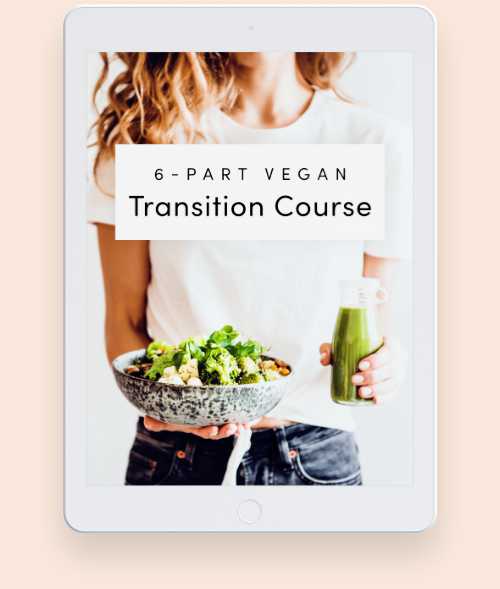
join our free vegan course!
Learn how to thrive on a plant-based diet with practical tips & a 3-day meal plan!
As per definition, veganism is an ethical lifestyle choice that seeks to exclude the exploitation of animals. However, the benefits of going vegan can go way beyond that!
Our in-depth article covers all areas of life that are affected by animal consumption. If you feel inspired to transition to a vegan lifestyle, feel free to join our 7-day vegan challenge and download our vegan grocery list!
We also listed 100+ easy vegan food swaps and created this handy vegan ingredients checker for you.
Let’s see why you should go vegan!
Top reasons to go vegan
Quick navigation:
Let’s take a look at each of these important factors.
Go vegan for the animals
This is arguably the most important reason to go vegan!
Non-human animals are individuals, just like us, who want to live and experience well-being and avoid suffering as much as possible.
We can see this individuality in our dogs and cats — but why stop there and not include pigs, cows and chickens in our moral circle as well? After all, most of us are self-proclaimed animal lovers!
Around 50% of the US population is in favor of abolishing factory farms and 75% think they buy animal products “from animals that are treated humanely,” which is in stark contrast to the reality of animal farming and the actual consumer choices:
According to the Sentience Institute, over 98% of all US farmed animals live in factory farms and globally, it’s most likely over 90%.
That’s 130 billion land animals suffering in intensive animal farming operations every day and we haven’t even started talking about fish, where the number goes into the trillions.
Over 70 billion land animals are slaughtered for meat alone worldwide — that’s almost as many humans that ever lived on Earth.
Most meat-eaters have never really questioned their behavior. After all, everyone around them is eating animal products, it’s convenient and they taste really good!
But are these good enough reasons to take the life of innocent beings if eating animals is entirely optional and we can be healthy on a plant-based diet?
Ethical farming myth
Forget the fairytale farmyards in children’s books — the overwhelming majority of farmed animals live and die in miserable conditions!
Even in the best-case scenario, animals are a means to an end and farmers are constantly faced with the incentive to overcrowd and cut costs to maximize profits.
Undercover investigations have shown time and again that “humane” farms are anything but; Operating economically always means growing the animals as fast as possible, packing them into places as small as possible and making them produce as much as possible.
No matter the farming method and welfare standard, even in the best-case scenario, animals get their throat slit or pushed into a gas chamber way before their expected life span.
Meat, dairy and egg production always ends with the unnecessary death of a sentient being who didn’t want to die!
Here’s what the sad reality for most farm animals looks like…
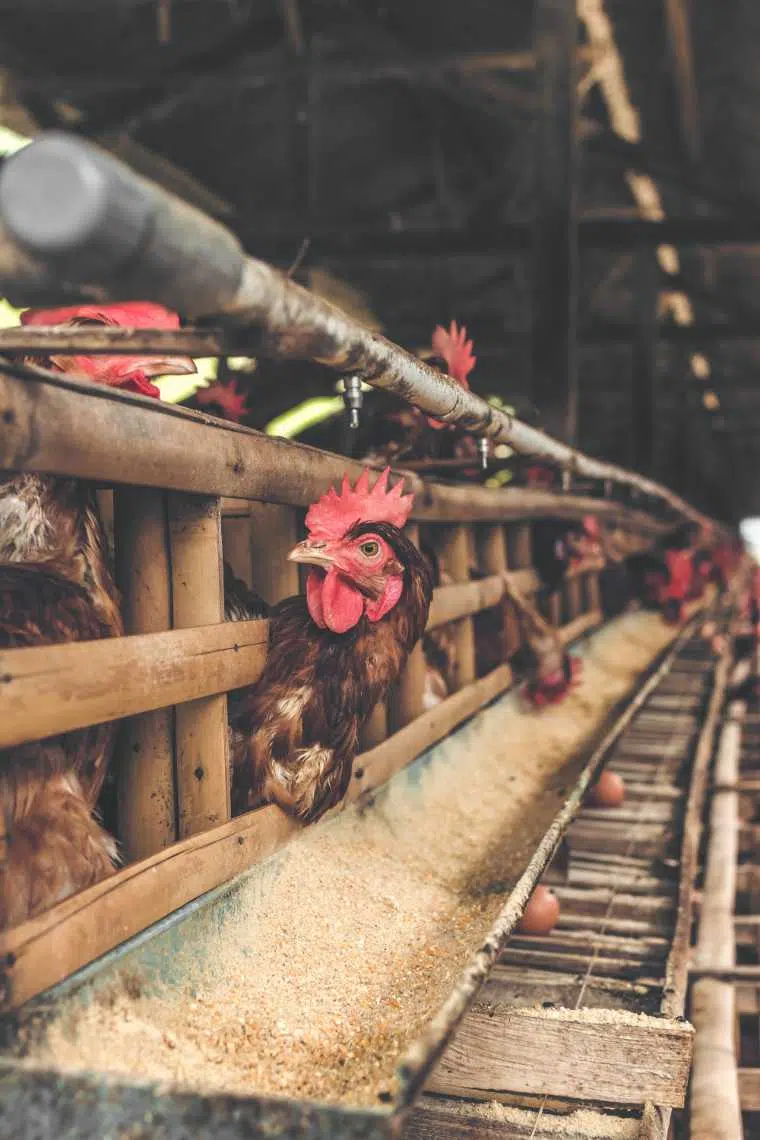
The reality of meat production
Chickens
In 2018, over 9 billion broiler chickens were raised and killed for consumption in the US alone. That’s a staggering number!
Chickens are selectively bred to gain weight as quickly as possible, from 1.5 ounces when they are born to 6-7 pounds in 50 days. “If humans converted food to muscle at that rate, a 7-pound newborn would weigh 450 pounds at seven weeks,” states poultry scientist Walter Bottje.
Soon after birth, little chicks are debeaked without anesthesia, so they don’t pick each other to death due to the psychological stress of living in such close proximity — a painful process during which many die.
Despite the enormous number of “poultry” animals, they are not included in the Humane Methods of Slaughter Act and can pretty much be killed and handled as the farmer sees fit.
Perhaps you’ve seen footage of chickens being crammed into large sheds that can hold tens of thousands of birds — unfortunately, this is all too common and can be labeled as “cage-free.”
Since they are bred to gain weight as quickly as possible, many birds can’t support their weight and are unable to walk. Some even suffer heart attacks or other premature deaths at the farm and are left to die right next to their peers.
Pigs
Pigs don’t fare much better on factory farms.
Sows (female pigs) are repeatedly impregnated through artificial insemination and all throughout their four-month pregnancy and after giving birth, mother pigs are kept in “gestation crates” so small they can barely move or turn around.
They often suffer from abscesses, sores and ulcers from the uncomfortably hard and filthy concrete floor.
Castration, tail docking and ear notching without anesthesia is standard practice in this industry; so is cramming pigs into slaughterhouse trucks and forcing them into gas chambers.
This slaughter method is officially considered a “humane way of killing.”
Of course, this makes a mockery of the word “humane,” which is defined as “having or showing compassion or benevolence.”
Defenders of the practice of pig castration, including the largest US pork producer Smithfield Foods, claim that it’s necessary to avoid an unpleasant taste of the meat.
In one study, researchers from the University of Minnesota found pneumonialike lesions on the lungs of 65% of 34,000 hogs they inspected.
This is due to the poor air quality in swine barns which also has negative implications for the slaughterhouse workers and any nearby residents — but more on that later.
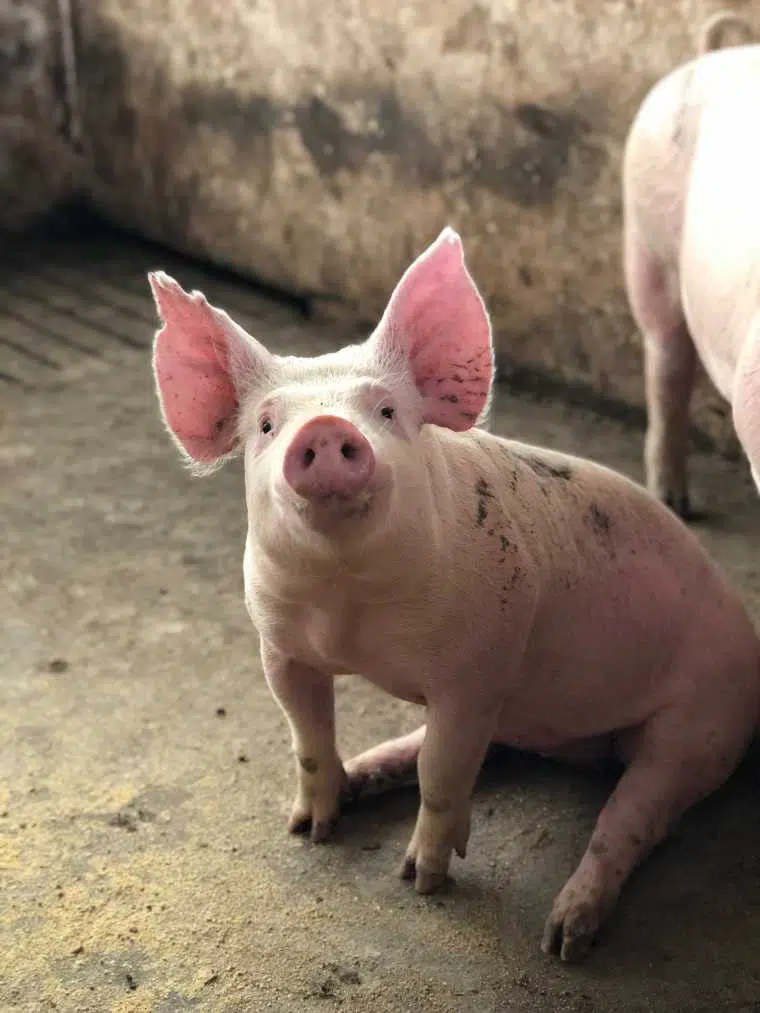
Cows
Similar to pigs, many cows are tail-docked. This means that either a part of or their entire tail gets removed — again, often without an anesthetic.
While this is intended to prevent injuries in the animal, studies have shown that it causes acute trauma, a lot of pain and stress and leaves lasting discomfort!
Furthermore, cows can be castrated, de-horned and branded without the help of painkillers. Imagine what that must feel like!
Cows raised for beef are the only farm animals that mainly live outdoors with no or little protection from extreme weather conditions.
They typically get sent to feedlots at the age of 6 months to 1 year to live the remaining months of their life without vegetated pasture. Yes, even grass-fed-labeled cows! That’s far from the scenic photos of cows grazing on lush pastures found on many meat products.
This is done to make them gain weight as fast as possible, but digestive problems may arise from the soy and corn they are fed in these feedlots. It can get so bad that some cows die from digestive diseases which is their second leading cause of premature death behind respiratory problems.
In nature, a cow can live until they are 15-20 years, but when raised for meat, they get sent to slaughter at around 1.5 years old.
Long road transportation, with little room, food or water, is widespread and many animals succumb to the stress and don’t even reach their final destination alive.
The dairy industry
Many of us are under the illusion that cows provide a constant supply of milk — and that we’re even doing them a favor when milking them and alleviating them from their bulging udders.
But like every other mammal, cows don’t just magically produce milk! They have to be pregnant in order to do so.
Since dairy operations seek maximum efficiency and profits, dairy cows get artificially inseminated once a year and thereby kept constantly pregnant which is extremely taxing for their bodies. They can’t even get pregnant on their own terms!
Of course, the cow’s offspring isn’t supposed to drink any of the precious milk, so the calf is immediately separated from its mother after birth, leading to psychological stress for both mother and child.
If the baby cow is male, he will end up in the veal industry and be killed after only a few weeks.
If the calf is female, she will meet the same fate as her mother: constant impregnation until the age of 4-6 when her milk production drops from exhaustion. At this point, the cow is deemed “spent” and gets sent to the slaughterhouse to be turned into hamburger meat.
Tie stalls are an especially medieval and cruel farming practice! While this is luckily not the norm, millions of dairy cows still face the reality of living their entire life tethered and restricted to one position.
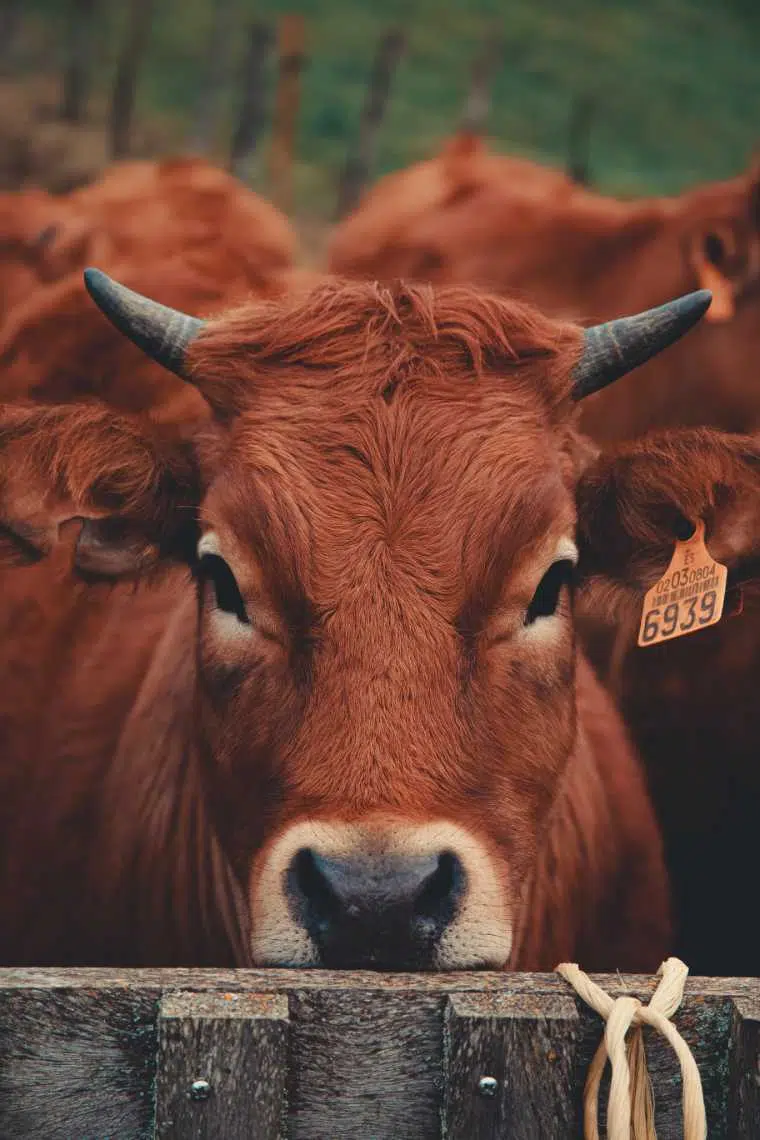
The problem with eggs
If you’ve been thinking “why don’t vegans eat eggs, no hen has to die for that?”, let us shed some light on this matter.
Unfortunately, battery cages are still the predominant form of housing for laying hens worldwide.
As of 2017, 85% of the commercial egg production in the US stems from battery cages; globally, the number is at around 90%.
Battery cages provide as little as 0.6 square feet of space per hen — that’s smaller than a typical sheet of paper!
The frustration of living in such appalling conditions is psychologically distressing for the chicken and can lead to abnormal pecking behavior and even cannibalism!
Sadly, the egg industry tries to guard against this not by allowing for better conditions but by cutting off or burning parts of the birds’ sensitive beaks.
Eggs are only laid by hens, so what happens to the male chicks that hatch in commercial egg facilities? Well, first, the newborn chicks are sorted and handled like inanimate objects to be separated into males and females.
The little male chicks are of no use for the industry and often get ground up alive or suffocated on the day they are born.
However, female chicks can’t expect a much better fate. Bred to lay 3,000% more eggs than they would in nature, they undergo the same torture as their mothers.
And as soon as hens don’t produce enough eggs anymore, they are sent to slaughter because keeping them alive is no longer economical. Talk about commodifying animals here!
Some will even withhold proper nutrition for up to two weeks to shock the bird’s body into a molt to kickstart a final egg laying cycle!

Environmental reasons to go vegan
The environmental impact of animal agriculture goes far beyond what you might think! From greenhouse gas emissions to land use, water use and pollution, this industry has a horrific impact.
Fortunately, changing our diet is the single most effective action we can take to reduce our environmental footprint! Small changes, such as replacing an animal-based protein source with a plant-based source, can make a tremendous difference.
This study compared the effects of producing 1 kg of protein from kidney beans to 1 kg of protein from beef.
It concluded that approximately 18x less land, 10x less water, 9x less fuel, 12x less fertilizer and 10x less pesticide use is needed to produce the beans.
More and more scientists warn that this dietary shift is necessary to reduce greenhouse gas emissions, use fewer natural resources and feed an expected world population of almost 10 billion people by 2050.
Let’s take a closer look at the environmental impact.
Global warming
The adverse effects of climate change are far-reaching — the WHO expects approximately 250,000 additional deaths per year from climate change-related effects between 2030 and 2050.
According to the FAO, 14.5 percent of all anthropogenic greenhouse gas emissions come from global livestock, more than the entire transportation sector combined.
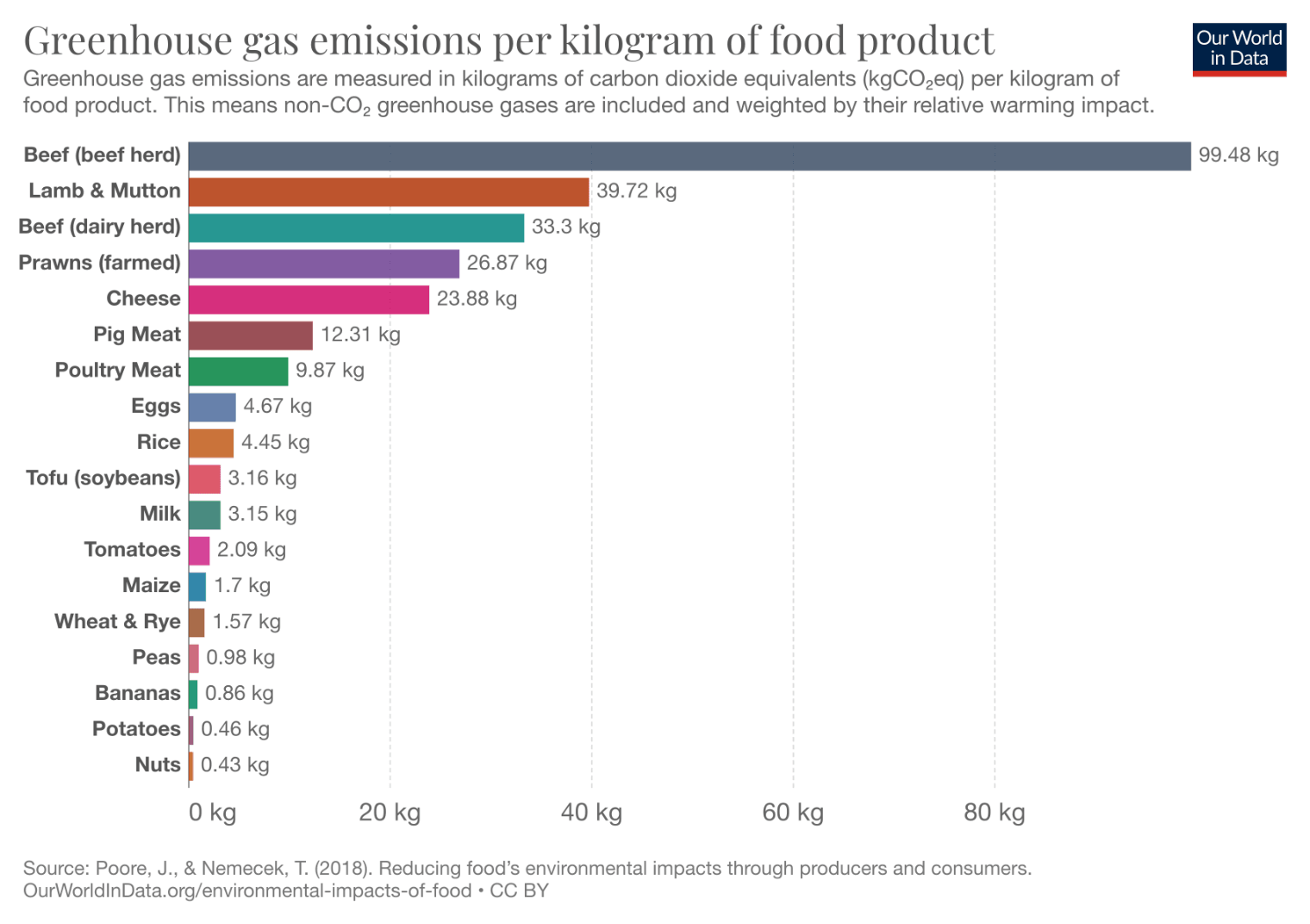
Source: Our World in Data
If you’ve been shopping locally produced animal products, brace yourself: while it is admirable that you want to support your local economy, in terms of GHG emissions, eating local won’t make much of a difference!
That’s because emissions from transportation make up only a tiny share of a foods’ entire carbon footprint. Other aspects like processing, animal feed, farm emissions and land use are much more impactful!
So, what you eat is far more important than where your food came from.
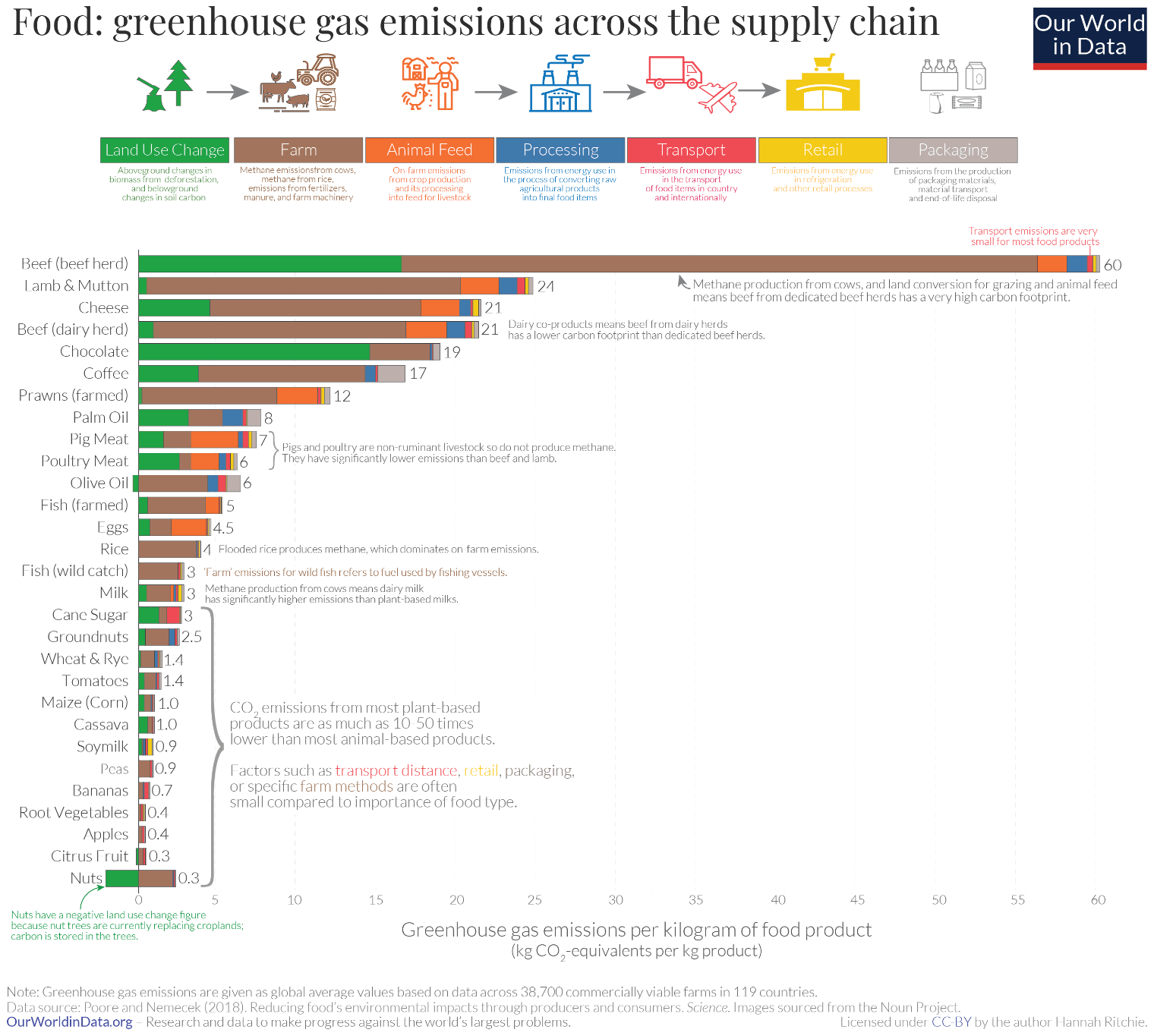
Source: Our World in Data
Land use
We have a finite amount of space on this planet to live on — and 30% of the world’s ice-free surface is occupied by livestock or to grow crops for livestock.
Let’s look at this number from another perspective!
A 2018 Oxford study found that while 83% of our farmland is used for livestock, it only provides 18% of the world’s calories.
“A vegan diet is probably the single biggest way to reduce your impact on planet Earth, not just greenhouse gases, but global acidification, eutrophication, land use and water use,” says Joseph Poore, who conducted the study.
A plant-based world would free up 75% of agricultural land — a size equivalent to China, Australia, the EU and the US combined.
This land could be used for reforesting to sequester up to 16 years’ worth of carbon dioxide from the atmosphere by the year 2050.
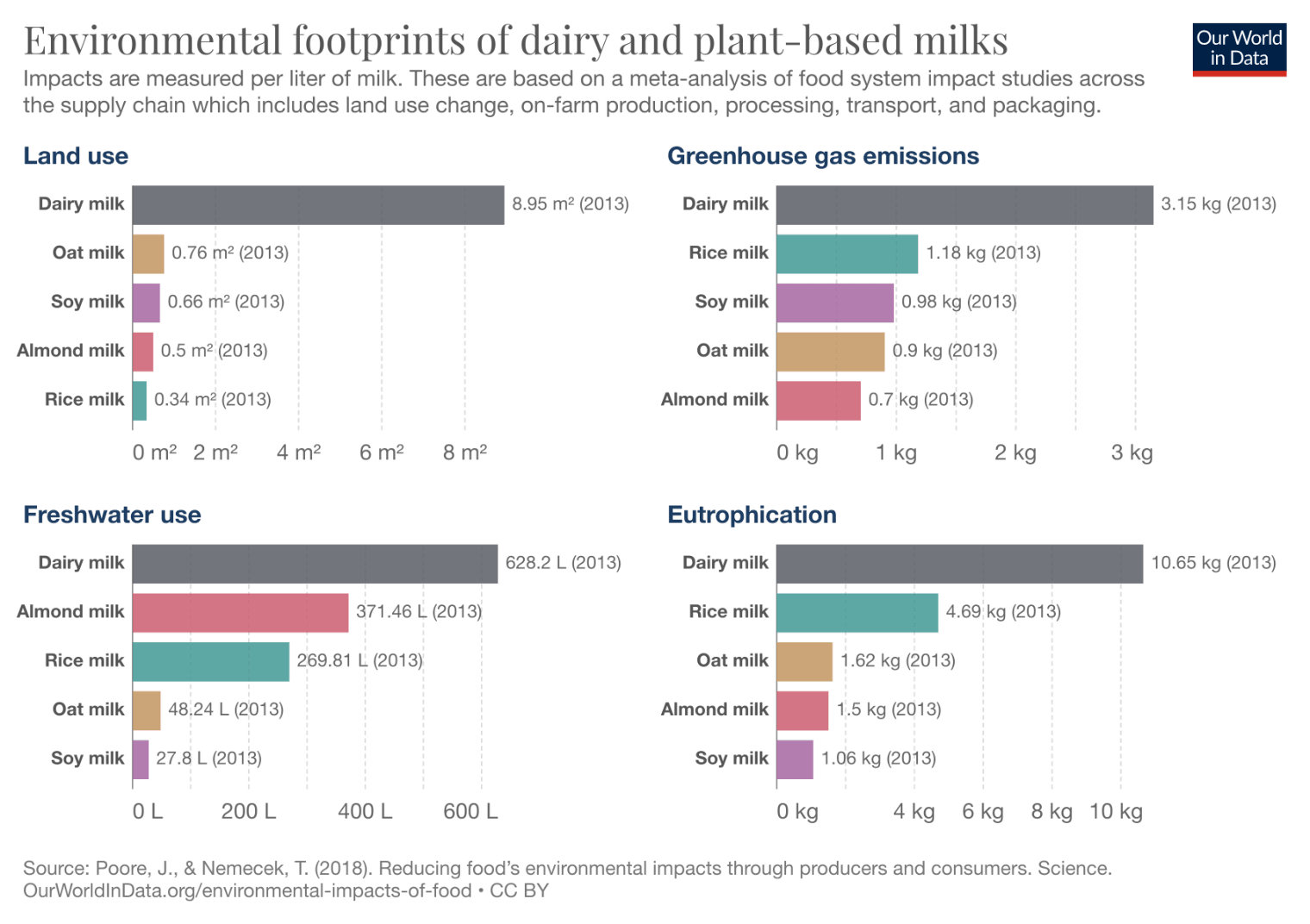
Source: Our World in Data
Wait, isn’t the rainforest being destroyed because of all the soy vegans eat?
Well, the growing demand for soy is indeed a driver for the rainforest deforestation — but 95% of the soy grown there is used for animal feed. Plus, a whopping 80% of the deforested rainforest land is used as grazing area for livestock anyhow!
So, why don’t we consume the protein-packed soybeans directly instead of feeding them to cows and receiving way fewer calories in return?
Water use
Freshwater is one of our most precious resources on this planet!
There are only a handful of plant foods that require a lot of water (such as nuts or rice), but in general, much more freshwater is withdrawn to produce animal foods.
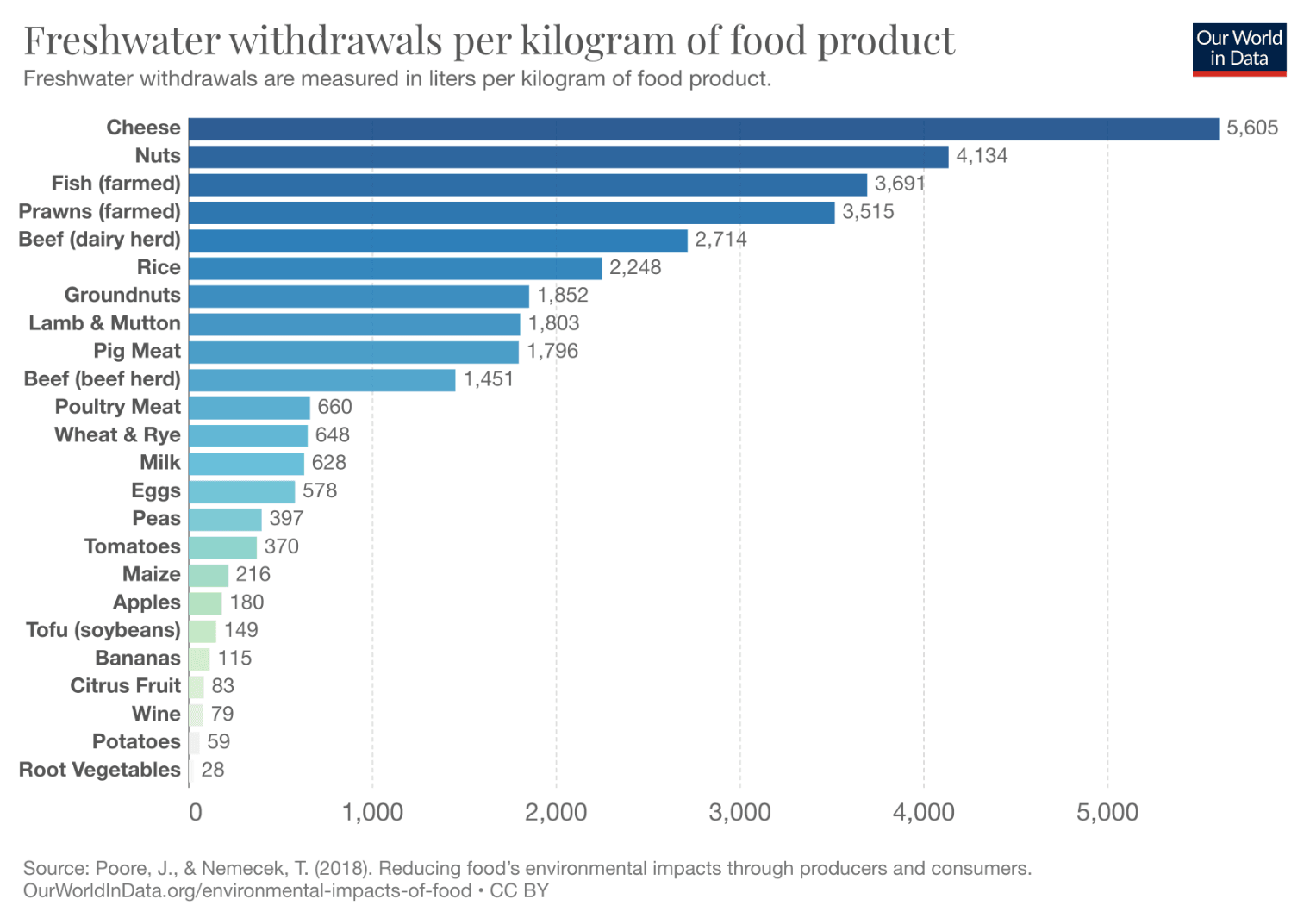
Source: Our World in Data
Apart from water use, water pollution from livestock farms is also becoming a growing concern!
Just like us, pigs, cows and chickens have to go number one and number two, right? Well, all of that manure is leaking into rivers and oceans.
This causes high levels of nitrogen and potassium to get into water systems, leading to eutrophication — a process by which water bodies become overgrown by algae and plants that use up all oxygen at the expense of other species.
“The livestock sector is growing and intensifying faster than crop production in almost all countries. The associated waste, including manure, has serious implications for water quality” — FAO, 2006
Go vegan for other humans
Even if you don’t care much about animals or the environment, there are good reasons to go vegan to protect the health of fellow humans and society as a whole.
World hunger
Although we currently produce enough food to feed the entire world, some people still suffer from hunger! That’s very unfortunate, and there are a couple of reasons for that.
First of all, we are unable to distribute food correctly and generate massive amounts of food waste instead.
Another significant factor is that many of our crops are fed to animals instead of being consumed directly by humans — which results in the loss of many calories.
Eating an animal that once ate plants will always be less efficient than eating the plants directly due to thermodynamic effects! Only 55% of the calories available from crops go to humans.
“For every 100 calories of grain we feed animals, we get only about 40 new calories of milk, 22 calories of eggs, 12 of chicken, 10 of pork or 3 of beef.” — National Geographic
This study finds that shifting the crops used for animal feed to direct human food consumption could increase global calorie availability by up to 70% and feed an additional 4 billion people.
What’s more, animal products can spoil much more quickly while plant-based foods like dry beans can easily have a shelf life of 2-3 years!

Antibiotic resistance & foodborne illnesses
Did you know that the WHO lists antimicrobial resistance as one of the top 10 threats to global health and the UN warns that drug-resistant diseases could cause 10 million deaths each year by 2050?
Here’s why this is relevant to our article on why to go vegan.
Antibiotics are far more heavily used in farm animals than in humans. Globally, 73% of the antibiotics we produce are used in animals raised for food — mainly pre-emptively to prevent infections and avoid financial loss.
Researchers fear that this may be the largest source of antibiotic-resistant bacteria and endanger public health. And our future as a species depends on still having antibiotics that actually work!
Another public health threat is foodborne illnesses, with salmonella, typically found in raw eggs and meat, being the pathogen responsible for the most hospitalizations in the US.
Yes, salmonella and other bacteria can potentially be found on plant-based foods — but still, their origin is, in most cases, the feces of animals.
Slaughterhouse workers
Would you personally like to work at a slaughterhouse? If not, why and how do you think slaughterhouse workers feel about their job?
With all that animal suffering in mind that we described at the beginning of this article, it’s easy to become agitated and demonize those people who pull the trigger — until you realize that they might not have had any better way to make ends meet.
Let’s face it, no one wants to kill sentient beings and the act of doing so repeatedly can have a severe psychological impact on those working in slaughterhouses.
Many US slaughterhouse workers come from low-income neighborhoods and about 37% are people of color.
Workers are often undocumented, can easily be fired and work despite safety concerns and illness due to the threat of termination.
A systematic review found a “higher prevalence rate of mental health issues, in particular depression and anxiety, in addition to violence-supportive attitudes.” There’s also “some evidence that slaughterhouse work is associated with increased crime levels,” according to the researchers.
First-hand reports, as well as studies, confirm that PTSD is another serious risk for slaughter floor employees.
Earlier, we mentioned the poor air quality in pig barns: filled with gases, dust, microbes and endotoxins, the air in these barns can induce lung dysfunction not only in the animals but also in the employees of these operations.

Pandemic prevention
Major health organizations keep warning us about the risk of zoonotic pathogens spreading from animals to humans. And what better breeding ground could there be than factory farms?
Think about it, we’re cramming tens of thousands of disease-ridden animals in tiny, unsanitary spaces and shipping them around the world — we probably couldn’t create a more threatening scenario if we wanted to.
This seems especially strange in times of an actual pandemic during which human beings are told to distance themselves!
The H1N1 ”swine flu” virus first circulated in pig farms in North America, then jumped over to humans and quickly turned into a pandemic that killed thousands of people.
Another historical example is the H5N1 avian influenza virus (with a 60% mortality rate!), first detected in 1996 and carried over to humans one year later during a poultry outbreak in Hong Kong.
Now that we’ve just seen how a pandemic can turn our lives upside down, shouldn’t we do everything we can to reduce the likelihood of another outbreak? Decreasing our individual demand for animal products is a powerful step we can all take.
Health reasons to go vegan
Being vegan for the animals will always be the most important factor in our lifestyle.
But we’ll gladly take the other perks that come along with it, like lowering our risk for chronic disease, managing our weight and improving heart health!
According to the Academy of Nutrition and Dietetics and the Dietitians of Canada,
“an appropriately planned vegan diet is healthful, nutritionally adequate, and may provide health benefits for the prevention and treatment of certain diseases.”
The British Nutrition Foundation agrees: “Well-planned vegetarian and vegan diets can be nutritious and healthy.”
With that out of our way, let’s look at some health benefits of eating a plant-based diet.
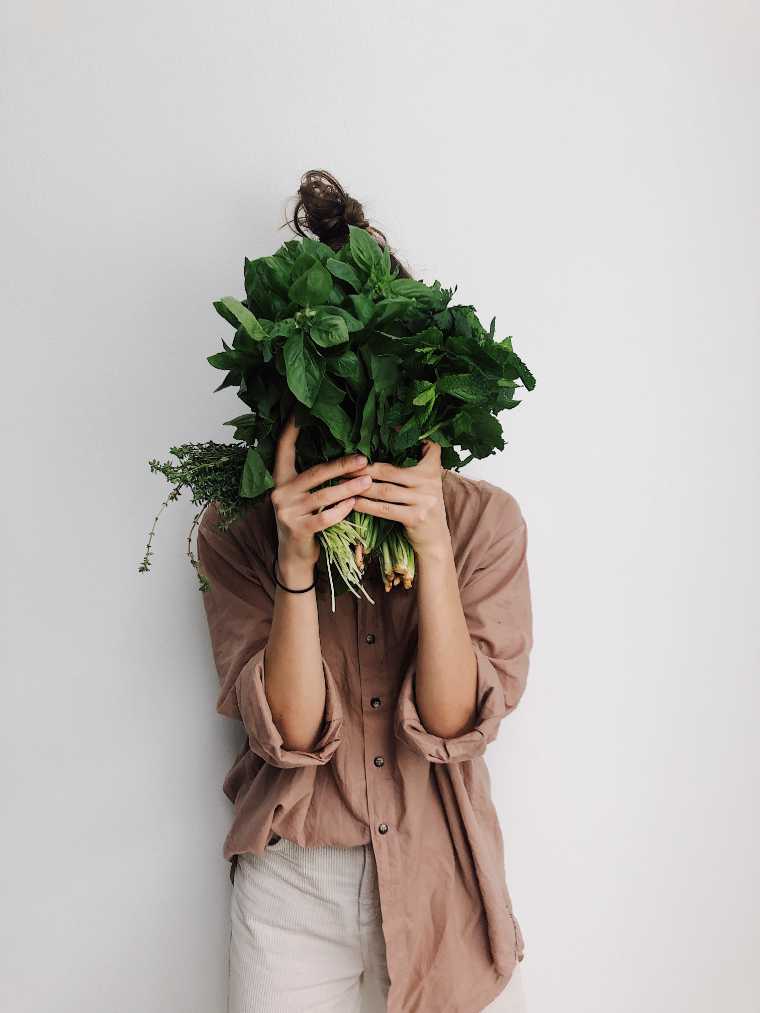
Weight management
On average, plant foods are lower in calories compared to animal-based foods. This makes maintaining a healthy weight much easier, especially if you focus on unprocessed plant-based foods!
Let’s dive into the research on plant-based diets and weight:
In the Adventist Health Study-2, the mean BMI was lowest in vegans (23.6) and went incrementally up in groups that ate more animal products: 25.7 in lacto-ovo vegetarians, 26.3 in pesco-vegetarians, 27.3 in semi-vegetarians and 28.8 in meat-eaters.
By the way, the vegan group was the only one in the “normal” BMI range!
Similar results were found in the EPIC-Oxford study, where the highest mean BMI was among meat-eaters (24.4) and the lowest among vegans (22.5).
This 2017 randomized controlled trial found that a whole food plant-based diet led to greater weight loss than any other trial that does not limit energy intake or mandate regular exercise — even after as much as 6 or 12 months!
Another two-year randomized controlled trial compared a vegan diet with the National Cholesterol Education Program diet and concluded that the former led to significantly more weight loss.
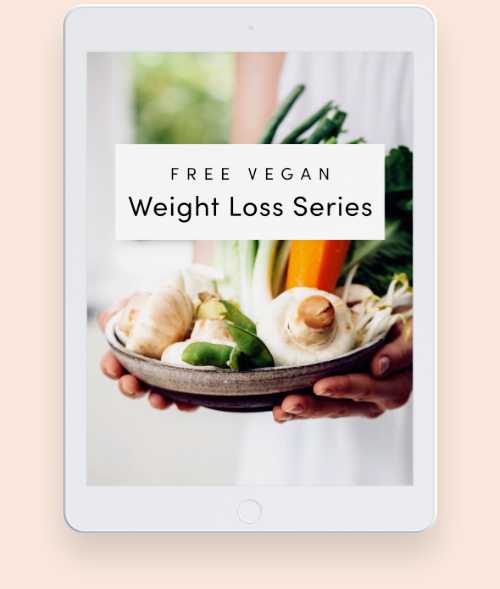
free weight loss email series
Getting lean while feeling full? Yes, that’s possible! Find out about easy food swaps, calorie density and 3 full days of eating for sustainable weight loss.
Cardiovascular health
Many of us know someone struggling with cardiovascular diseases — and that’s no surprise.
They represented 32% of all global deaths in 2019 and most of these deaths could have been prevented with lifestyle choices, including a healthy diet!
Studies repeatedly showed that vegans do best when it comes to disease markers for heart disease, such as serum cholesterol levels.
Some of this can be attributed to the fact that vegans tend to be less overweight, but a large proportion of the difference in serum lipid concentrations is caused by the diet itself.
Replacing trans fats and saturated fat (typically high in animal foods) with high-fiber foods (aka plants) or polyunsaturated fats is your best bet to decrease heart disease.
The American Heart Association recommends an upper limit of 5-6% of total daily calories from saturated fat. If you’ve ever been tracking your nutrient intake, you’ll have noticed that just a small amount of animal products (or certain vegetable oils!) will put you over this limit.
Looking at the bigger picture, this meta-analysis collected the data from 5 prospective studies with over 70,000 men and women in total. It found that a vegan diet led to a 26% lower mortality from ischemic heart disease and 30% lower mortality from stroke! That’s a lot of lives saved.
Studies such as the EPIC-Oxford study or Adventist Health Study-2 also found that vegans have by far the lowest rates of high blood pressure among any diet group with a 50–75% reduction compared with meat-eaters.

Diabetes
Let’s talk about another widespread health issue. Over 11% of the US population has diabetes and 38% of the adult US population is considered prediabetic — it’s a major cause of death and disability.
In the Adventist Health Study-2, over 40,000 people were followed for two years to determine the development of type 2 diabetes. Even when adjusted for confounding factors such as the BMI, a vegan diet showed to reduce the risk for diabetes by 62%!
This is in line with other evidence: This 17.6-year follow up of over 45,000 people found that the risk for death from diabetes was cut in half among vegans and this meta-analysis concludes that higher fruit or green leafy vegetable intake is associated with a significantly reduced risk of type 2 diabetes.
Another randomized trial found that a low-fat vegan diet fared better than a diet based on ADA (American Diabetes Association) guidelines to improve glycemic and lipid control in type 2 diabetic patients.
On the other hand, red and processed meat seem to have the opposite effect and increase the risk for diabetes.
Cancer risk
Cancer is the second leading cause of death in the United States and there are still many aspects unknown about this tragic disease.
However, there are certain things we can learn from vast cohort studies that follow participants over many years!
The Adventist Health Study-2 suggests that vegetarian diets offer some protection against cancer, especially gastrointestinal and prostate cancer (which accounts for 27% of all cancer incidents in men).
In this British cohort, cancer risk was 18% lower for vegetarians compared to meat-eaters.
Whole grains, fruits and veggies are consistently found to reduce the risk of all sorts of cancers, while red and processed meats, on the other hand, are strongly associated with an increased risk for colon cancer.
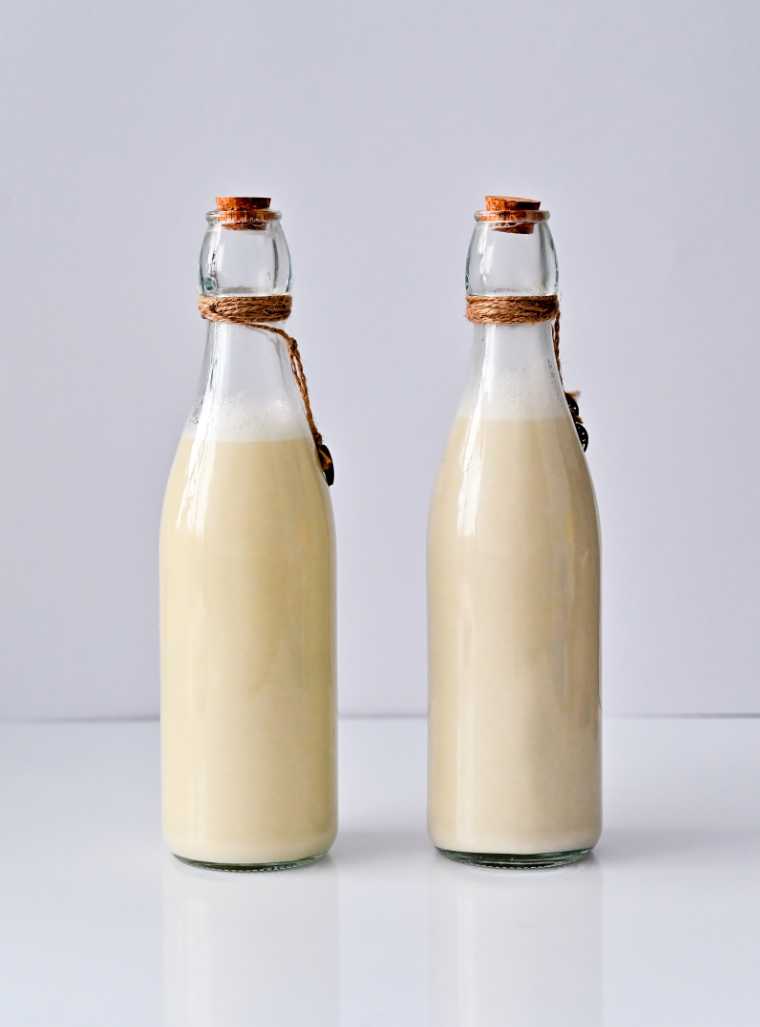
The problems with dairy
Lastly, let’s take a closer look at dairy consumption in particular and what some people can expect when going dairy-free.
A 2018 meta-analysis looked at all the available data on dairy and skin outbreaks and found a positive association between milk consumption and acne risk.
What’s more, did you know that 68% of the world’s population has lactose malabsorption and can experience digestion issues when consuming dairy? These people will definitely benefit from choosing plant-based milk in the future.
And finally, let’s talk about pus. Because dairy cows have to produce large quantities of milk which is regularly taken from them with the help of milking equipment, their udders can become sensitive and infected.
This painful condition called mastitis generates pus at the cow’s udders which usually ends up straight in your milk!
A USDA report found that one in four US dairy cows suffers from this condition.
The current legal limit for somatic cells in milk is 750,000 cells/mL in the US, which is incredibly high considering that a cell count above 250,000 indicates an infection with significant pathogen levels.
Other benefits of going vegan
There is no doubt that the raising, slaughtering and processing of animals until they end up on our shelves costs a whole lot of money! Not only for the producers but also for society as a whole.
Even though we might have to pay less for a beef burger than a veggie burger at the store (which is crazy enough!), there are many hidden costs in animal products.
They are usually subsidized with our tax money and with their enormous environmental impact, meat, dairy and eggs will lead to even more costs in the future when we’re confronted with the consequences of climate change.
Plus, with the increased risk of developing zoonotic pathogens that may put large parts of the world into lockdown, the burden of our healthcare system and the economic price we pay is enormous!
At the same time, eating plant-based foods can actually be cheaper. Yes, you’ve read that right!
Especially if you swap beef or chicken for dried or canned beans, the savings add up over time.
We personally enjoyed discovering many new foods and dishes after going vegan, plus we met some lovely new people that are in the same boat!
Free vegan meal plan
If you feel inspired to go vegan now, download our free 50-page eBook with transition tips and a 1-week meal plan!
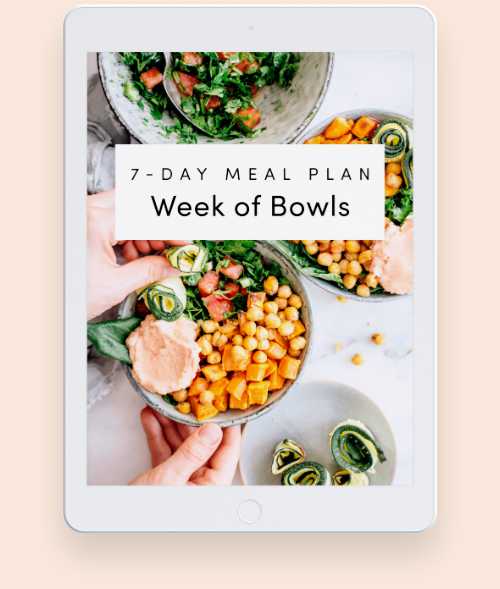
free 7-day vegan meal plan
Your next week of eating is planned out with these quick and delicious vegan bowls, meal prepping steps & full grocery list.
More vegan guides
Interested to find out how you can be happy and healthy on a vegan diet? Read these articles next.
- Plant-Based Protein 101
- Vegan Muscle Building
- Inspiring Vegan Documentaries
- Being Vegan on a Budget
- Best Vegan Books
Which of these reasons to go vegan spoke to you? Let us know in the comments below, share this article with your friends and Pin it here.

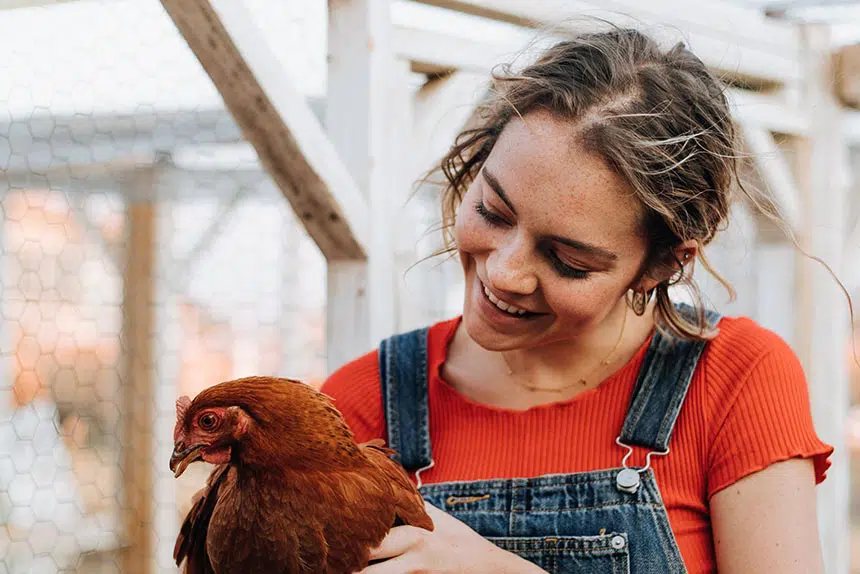
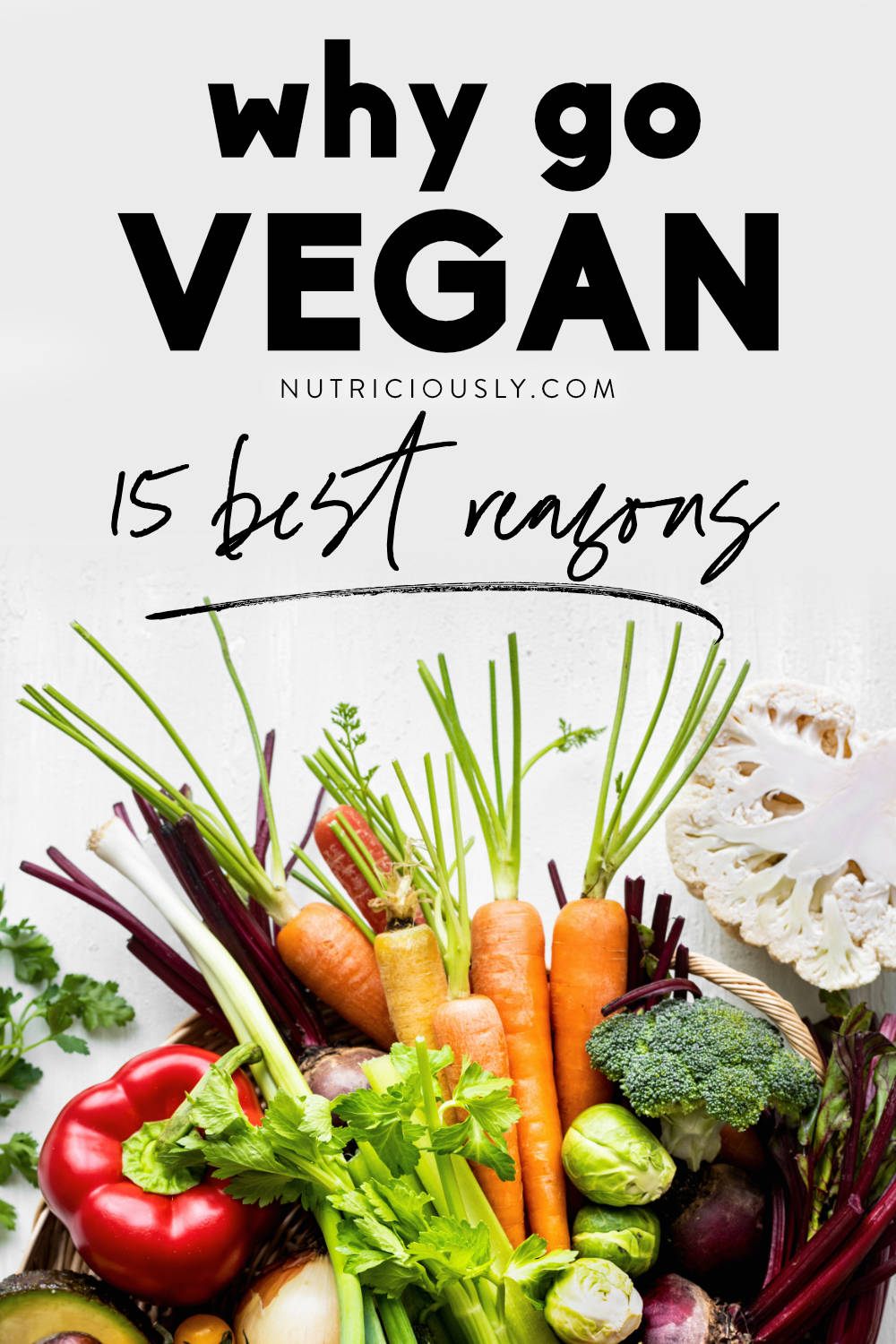
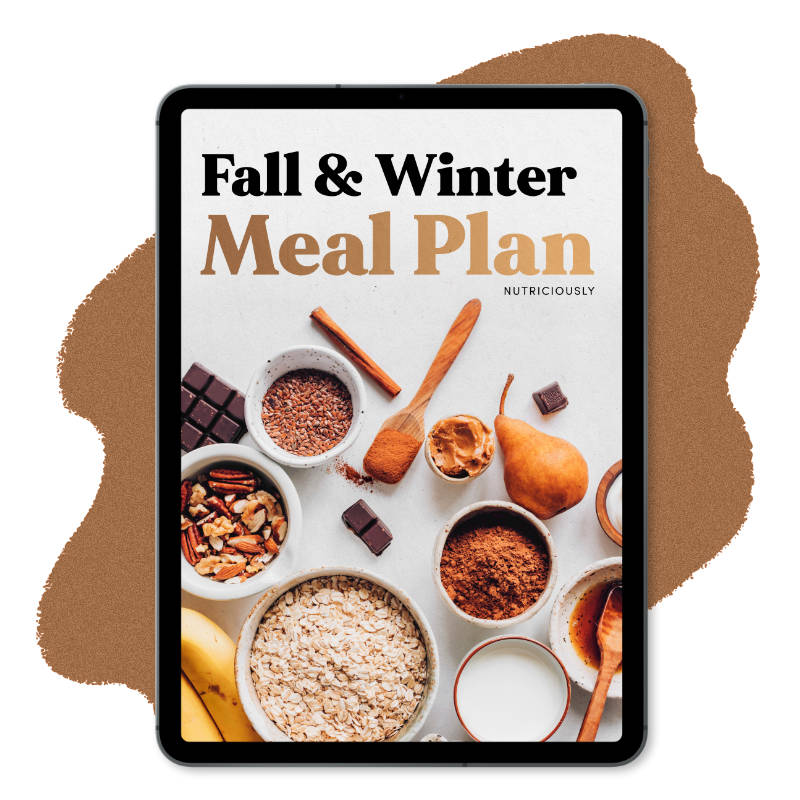

All excellent points. It’s interesting that while I never considered myself a vegan, the net result of my decision to adopt a whole food plant based lifestyle is essentially the same. I’ve been doing this for 5 years now and don’t regret a single day. I came to my decision because my health. I was/am not sick but I wanted to experience a higher level of physical vitality that I believed this lifestyle could help me achieve. I’m happy to say, it has been and continues to be an amazing ride.
Other than reading online what other people are doing, I don’t get a chance in real life to interact with many people like those that visit this site. I’m always curious as to what it was that brought individuals to this point (i.e., adopting a vegan or plant-based lifestyle).
Great post and a great way to start 2017!
Hey Jeffrey,
thanks for your awesome comment! I love how your striving for great health has brought you to a plant-based diet and maybe to veganism as well. This lifestyle includes not buying any animal products, such as wool, leather, silk, fur or cosmetics tested on animals as well. Vegans also don’t ride horses or elephants and don’t go to the zoo. None of these things have to do with health but rather the greater ethical concept of not using or owning other beings, no unnecessary harming. We love living and eating this way since it feels great and is very much in tune with our morals :)
Feel free to join our facebook group if you’d like to get more online communication!
Hope this finds you well,
best
Alena
Hello Alena
I’m not a vegan, but I’ve been struggling with stomach problems and oily skin from eating too much dairy. I’m working towards cutting down on it, and focusing on a plant-based diet. So much of health depends upon what you eat. I’m incorporating more soups and fresh veg. My father has high blood pressure, so that’s one huge reason to be careful of what I eat, as I understand that hypertension can be inherited.
Hi Deborah,
thanks for your comment! I’ve seen so many people’s skin get better on an oil-free plant-based diet. Just check out the story of these twins: https://www.forksoverknives.com/how-we-cured-our-cystic-acne-with-diet/
Dairy is a great first food to be cutting out. I’d argue that it’s worse for you (and the animals) than most meats but then again, I’m no health expert. Check out Dr. Caldwell Esselstyn or Dr. Kim Williams (both cardiologists) for great tips on what to eat to prevent & even REVERSE heart disease.
Wishing you & your family all the best!
Alena
Tiger Wallpaper
hi ! i am a 14 years old going vegan. i am already vegetarian not in order to lose weight or anything like that, i just dont like the taste of meat since the day i was born. i loooove pancakes and i always put honey as a topping but as a vegan can i still eat honey? and if not is there anything i can replace it with? greetings from tunisia
Hi there,
awesome to know you’re trying to go vegan! Take it step by step and try having your pancakes with maple syrup or agave nectar. There’s even coconut syrup and other plant-based sweeteners out there, not sure what you can find in Tunisia, though.
Honey is an animal product – we’ll soon write an article on it to let you know more about the implications. It’s your choice whether or not you want to cut it out!
Hope this helps.
– Alena
These are all excellent points. Veganism is more than a diet, but it’s the easiest way to start. Benefits are abundant, not just for your health, but for the environment, animals, and future generations. Whole new world of tastes, textures and recipes open up to you. It is absolutely positive life change. As a long time vegan I can attest to this. What I like to point out to my friends who are considering veganism or vegetarianism is to not get discouraged if they don’t succeed at first try. There’s no right or wrong way to go vegan, so don’t be afraid to try a few strategies, find out what works for you.
Thanks so much for your valuable input! Will be very inspiring to others :)
Stopped eating meets weeks ago, same with eggs. Followed with replacing cow milk with plant-based one (I have them all until I found out about Hemp milk), also replaced yogurts with non-dairy once. Cutting on more stuff every week. Your writings are very inspirational, and useful. Thank you for doing that all!
Hey Lucy,
thanks so much for your comment! How inspiring to see you make these changes. Wonderful to know that our work has been useful to you :)
Let us know if you ever need more support!
Best wishes,
Alena
Hey Alena,
I’m sixteen years old and have been, for the past month, slowly transitioning to the average Vegan diet. The one thing that has been holding me back, however, is my cautious mother who wishes to know more about the lifestyle and what it can provide for me. In particular, she is concerned about protein and certain elements that can ‘only’ be gotten through either meat or supplements. She does not want me to be reliant on supplements and fears that my health may be at risk in fully transitioning. Are there any tips/advice/sources in which I can give her to help and persuade her? Thank you in advance for any advice you might have to give on the subject!
Dear Emma,
thanks so much for reaching out! Wonderful that you’ve come to the conclusion that you would like to follow a vegan diet. I can understand that your mother is a little concerned because we’re all trained to believe how essential animal products are… the truth is that we’re far better off without them. No essential nutrient is found in meat, dairy, or eggs that we cannot get from plants – with the exception of vitamin B12 which isn’t made by animals, but by bacteria. Nowadays, livestock is being supplemented with this vitamin as well and you’re probably getting it in this “synthetic” form one way or the other. Some foods are also fortified with B12. Around 40% of the population is low on this nutrient and pretty much everyone eats animal products, so you tell me… here’s more on that: https://nutriciously.com/how-much-b12-should-i-take/
Protein actually comes from plants (amino acids, that is), that’s how cows or giraffes or elephants get it too and they seem to be growing strong, right… more on that here: https://nutriciously.com/plant-based-protein/
And I thought you might also like this video: https://www.youtube.com/watch?v=aqdeEMBXZck
If she’s into scientific proof, show her this paper: https://www.andeal.org/vault/2440/web/JADA_VEG.pdf It states “appropriately planned vegetarian diets, including total vegetarian or vegan diets, are healthful, nutritionally adequate, and may provide health benefits in the prevention and treatment of certain diseases. Well-planned vegetarian diets are appropriate for individuals during all stages of the life cycle, including pregnancy, lactation, infancy, childhood, and adolescence, and for athletes.”
Both Lars and I have been vegetarian since we were 6 and vegan for 6 years now :)
Feel free to email us if you need more support!
Best wishes,
Alena
Hi there, I have been wanting to be a vegan for a while now. I think there is a great effect and impact on the world switching to a vegan diet. My only problem is I have always liked meat and cheese. Do you have any suggestions on what I could do? Thank you. :)
Hi Maya,
thanks for getting in touch. Here are my thoughts on your situation:
1. Learn and remember why it’s actually kind of disgusting to eat these animal products. Watch some footage to really understand how they are made etc. They won’t seem so appealing to you anymore.
2. Get some vegan mock meats and nut cheeses (you can also make them yourself) and get used to them over time as a replacement. I understand they are not exactly the same but they can do the job. You can use these products to crowd out the animal-based foods.
3. Stick it out, taste buds actually change :) It’s not like foods that are not meat or cheese aren’t tasty, right? Many people say they lose their taste for something when not eating it for a while. You kind of crave what you’re used to eating.
Hope this helps! You can do it x
Hi Alena,!
Proud Vegan here :)
Thank you for doing this tho. You’re doing a great job. Keep it up!
Awww thanks so much for this lovely feedback! So encouraging :) Happy to know you’re a fellow proud vegan x
As the son of a dairy farmer, (and I’m a farm worker) what do you think these farms are going to do when everyone goes vegan and there is no profit in farming anymore? NGO’s won’t have enough funding, chickens, hens, sheep etc will all eventually be taken out by foxes and other predators, and what will my father and I go do for work? And all the people working that make cheese, milk, yogurts etc…. Think about the people and the animals when switching to a vegan diet… farmers are NOT harming the animals… Animal abuse is a COMPLETELY different topic, animal abuse is when farmers aren’t feeding cows properly etc… The majority do feed them properly though because that’s their JOB… So think about the employers, workers and that the animals are actually being LOOKED AFTER. By the way, I heard a recent statistic that you need to eat 63 brussell sprouts to get the same amount of protein as is in a glass of milk, and I’ve heard vegans are using brussell sprouts as a replacement for protein, which obviously isn’t healthy. So what about 14 reasons NOT TO GO VEGAN?????
Hi Sean,
some other people replied to this below which you can check out – here are some of my thoughts!
1. Eating animal products, no matter how the creatures were treated, is worse for the environment than eating only plants.
2. Even animals that are being looked after are forcibly impregnated and end up being killed unnecessarily. That’s what I would call abuse, we don’t need to look at factory farming for that.
3. Just because someone earns money doing something that’s unethical doesn’t make it right to do so. As the demand for plant-based products increases, those in the animal agriculture can shift also and create what people are demanding (breeding fewer animals into existence, those who would be left at the end could end up in sanctuaries). Happened when we abolished slavery or got machines/computers to do certain jobs for us. We will get through this one as well :)
4. You can easily get your 50-60g of protein per day by just eating grains, legumes, and some veggies. Nobody would want to meet their requirements by munching on Brussell’s sprouts. Do you know more people with protein deficiency or heart disease? And you need to eat 0 grams of animal protein to stay under the safe amount of dietary cholesterol.
Cheers, maybe you think about these points or research on them on your own. Nobody is forcing you to change anything, that’s all on you :)
Your mindset concerns me, severely.
Your close mindedness and lack of sympathy for the environment concerns me, viciously.
I started my vegan diet about a month and a half ago and i have been vegetarian for two years. It is so inspiring and motivating for me to see posts like this and further justifying my choice to get all animal products out of my life. I have loved being a part of the vegan community. Any suggestions for the best vegan fast food options? :)
So happy to be having you as a part of our community and glad that we could inspire :) Coincidentally, we have a full blog post on vegan fast food options here: https://nutriciously.com/vegan-fast-food/
maybe just make dairy free yogurts, milk, and cheese, because if everyone goes vegan we’ll be needing more of those types of products so you’ve still got a job! :)
great suggestion, I agree! Nothing becomes ethical just because it offers some people jobs :)
I am thinking about to started my vegan diet in next week. Hope so your tips are help me about this. And i will keep following your site from now. Thanks for the sharing such a informative article.
That’s wonderful to hear, Debbie! Thanks so much for stopping by and letting us know – we have lots of free resources here on the website. You can also join our Facebook support group or reach out via email if you’re feeling stuck or overwhelmed :)
I have been a vegetarian for almost 13 years with the exception of gelatin (I’ve stopped eating that a couple of weeks ago,) and I would like to go vegan or at least lacto-vegetarian. Two problems.
1) vegetarian parents that think cheese is a god or something
2) me being a baker and having a love for sweets (cake, cookies have eggs)
Any ways for me to substitute/ convince my parents?
Oh, also, my dogs aren’t vegetarian (duh) so do you know of any dog food that cuts down on meat? Sorry that was stupid.
-Becky
My husband has a severe nut (peanut and all tree nuts) allergy. What are some alternatives to nuts if I must live in a nut free environment?
Thanks
I had no idea that vegans are the only people who consistently average a normal BMI. I think that vegan cooking is a great way to improve the overall quality of your health and your life. My wife and I want to find a vegan food cooking class, so we’ll be sure to do some digging in order to find one that fits in with our schedules.
Hello Alena,
I’ve been thinking of going vegan for some time now. I don’t really have any support about it because I come from a community of hunter’s and religiously meat eaters. After reading many articles and watching videos I’m still coming to the same conclusion; this is expensive for someone with a low LOW budget. For example, people who get food-boxes to support their families. Normally, I would just wait until it’s more convenient for me to be able to switch over but the guilt is very much getting to me. I was at a friend’s house and he had made burgers, I literally couldn’t take a bite and kept thinking about the poor animals and starving children who could have better opportunity for food. This is making it extremely difficult to eat anything that is available for me and it is all becoming exceedingly harder. Any advice?
Having been on a bachelor party to Vegas in March with 8 guys 2 of which are vegan I made the change myself.
So much of what the 2 guys taught me and spoke about made so much sense that I thought I’d try it. I had been struggling with digestion for a couple of years and it seemed a logical choice.
I went all in from the word go and haven’t looked back. I felt much healthier in 3 days and after 3 months I know this is the life style for me. I would encourage everyone to at least try it, even if for just certain days a week. The difference it makes to your body is incredible and he benefits just keep coming.
Give it 20 years and half the world will be vegan and hopefully we will see the benefits to our planet.
Good luck all
I never knew that there are over 20,000 species of edible plants in the world! My husband and I have been thinking of converting to a vegan diet since our current dietary habits are causing us some health issues, and we need to be more mindful about what we’re putting in our bodies. Hopefully we can find some great dishes to help make the transition smoother!
What type of milk you you give a baby after he turns a year old? Typically pediatricians say cows milk after a baby turns a year. What would be a good alternative for bone, brain development?
Thanks for your question! The Academy of Nutrition and Dietetics has this answer: “After 12 months, vegan infants may be weaned with soy milk fortified with calcium and vitamins B12 and D. If a vegan baby is weaned from breast milk before 12 months, they should receive vegan infant formula until they are 1 year old. Milk alternatives, such as soy, rice, almond, hemp, etc., are not recommended during the first year of life as a primary drink because they do not have the right amounts of nutrients.”
im vegan and this is cool but what are your sources?
thanks, Bella. We used different sources all throughout the article, you can find them as links wherever there’s a green word :)
Hello Alena,
I’m a Vegan who relapsed into eating dairy and even some animals again. I feel awful about it. It does not sit well with my soul.
I am returning to veganism and I have to make sure I get the right amount of amino acids, calcium and proteins.
Is there a Vegan eating book or guide, you have found helpful, in order to make sure I get what I need, at this crucial age of fifty-three? –Through my vegan food choices.
Also, do you guys use supplements?
Thank you.
Peace, Wave
I’m certainly not Alena, but here are a couple websites I came across that might be helpful to you: https://www.vrg.org/nutrition/seniors.htm https://www.vegansociety.com/resources/nutrition-and-health/life-stages/older-adults
There is also a book called ‘Never Too Late to Go Vegan’ by Carol J Adams, which, although I have never read it myself, looks to contain helpful resources and nutritional suggestions for vegans over 50.
Hope this helps!
thanks, Danielle! Great tips and thanks for jumping in, I cannot keep up with all of the comments everywhere unfortunately…
Hey Alena you used this statement, “Did you know that each day, a person who eats a vegan diet saves 1,100 gallons of water, 45 pounds of grain, 30 sq ft of forested land, 20 lbs CO2 equivalent, and one animal’s life?” i want to use it in my dissertation, i was wondering if you had any sources linking where you found this out? Thanks!
Hey Jeff, we have that fact from the cowspiracy page here: https://www.cowspiracy.com/facts
lots of great sources! Have lots of fun with your dissertation, it’s probably very interesting when it contains such facts.
Best,
Alena
Wow – this is one of the most compelling ‘why vegan’ pages I have ever read. I am trying to write my own for my blog right now and it is a challenge. Not because of lack of facts, but because I am having trouble making the facts into meaningful dialogue instead of just bullet pointed sources. Your post did such a good job of this. Thank you for the inspiration.
awww thanks so much for the kind feedback! Yes, that’s the challenge, isn’t it – communicating in a clear, motivating and straight-forward tone. Hope we achieved that :)
Hi Alena,
Thanks to this amazing blog I finally turned vegan I feel so much better, Thanks a lot!
what a lovely comment, thank you soooo much for this! :)
I’m doing a paper for school about going vegan to become more healthy and eco friendly, and this paper has honestly opened my eyes and helped me tremendously. After reading this, it’s safe to say I’m dropping meat and eating a whole lotta oatmeal instead. Thank you for the wise words!
I studied environmental science in Uni, and, unfortunately, there is…a lot of incomplete/inaccurate information here. :/
Like… a looooooot.
we’d love to know which of these facts are inaccurate! Can you link us to some sources? We are always open to improve our work :)
Tantas y tantas razones para ser vegano..los sabios antiguos tenían una regla o base moral muy profunda y bella “devoción a la vida y respeto a todo lo que tiene vida”…con solo este principio comprendido y aplicado por todos..que mundo tan diferente tendríamos saludos a todos los veganos del mundo
además de la crueldad con los animales y daños al medio ambiente…que bueno es evitar alimentos cochinos y podridos que generan tóxicos muy potentes como purinas. parvolinas, neurinas etc.
No doubt you have shared valuable information regarding vegan diet. Now there are a lot of people who are heading towards adding vegan products in their diet. Its a good way to get a healthy lifestyle and protect environment also.
I am a proud turned vegan from pescatarian. Thanks for the info! By the way, corn or maize is NOT a natural veggie, its man-made which is why the human body has trouble dissolving it. Don’t eat it.